
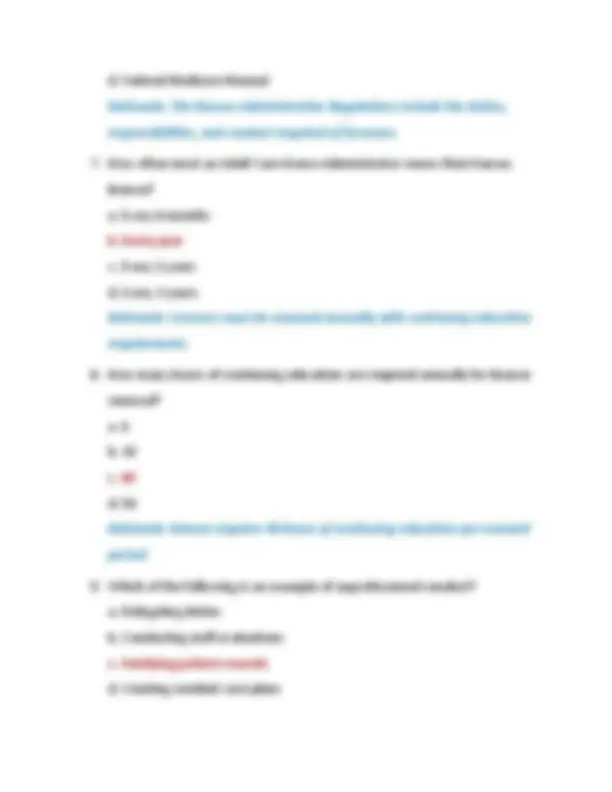
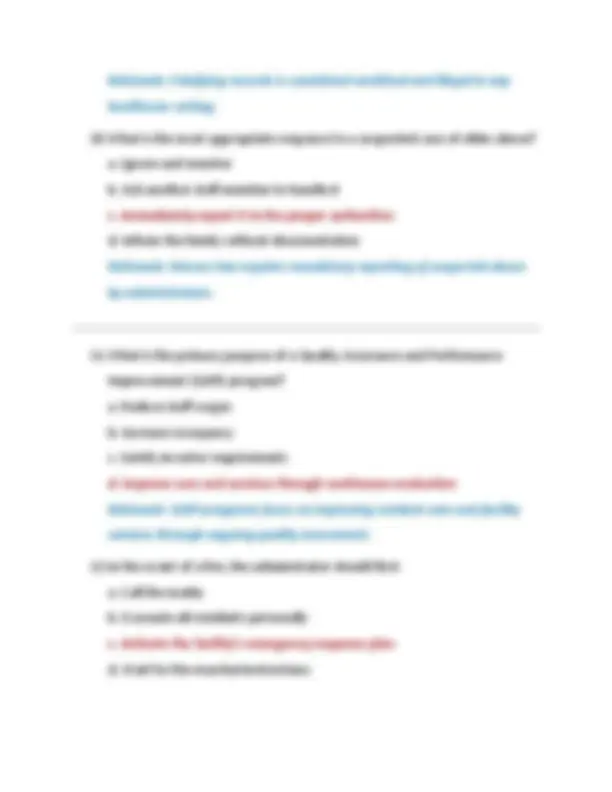
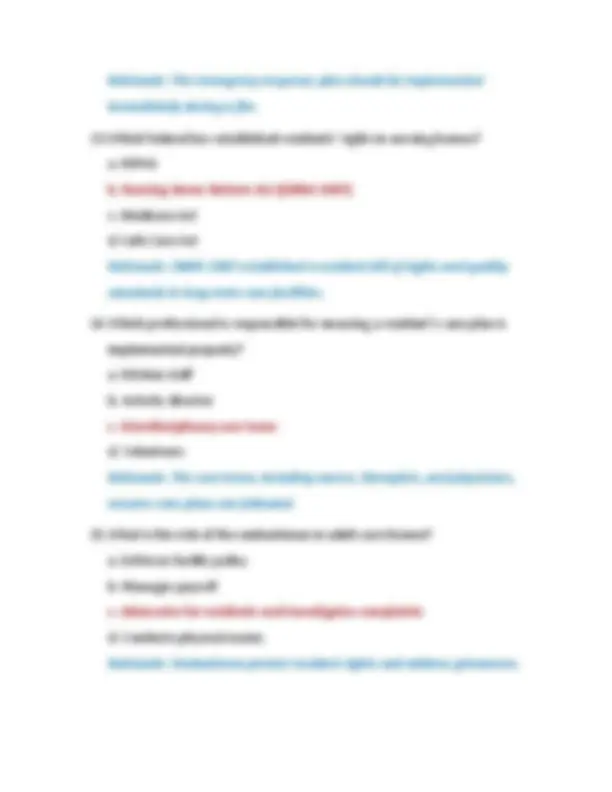
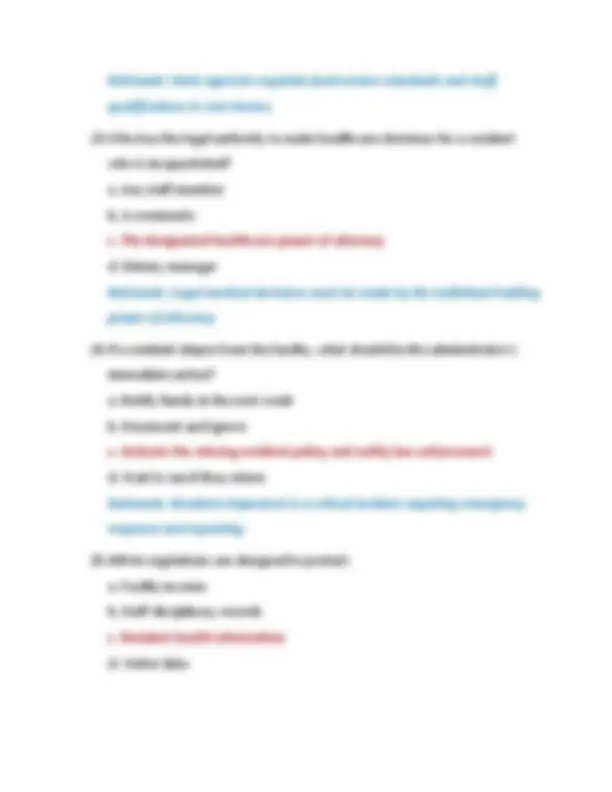
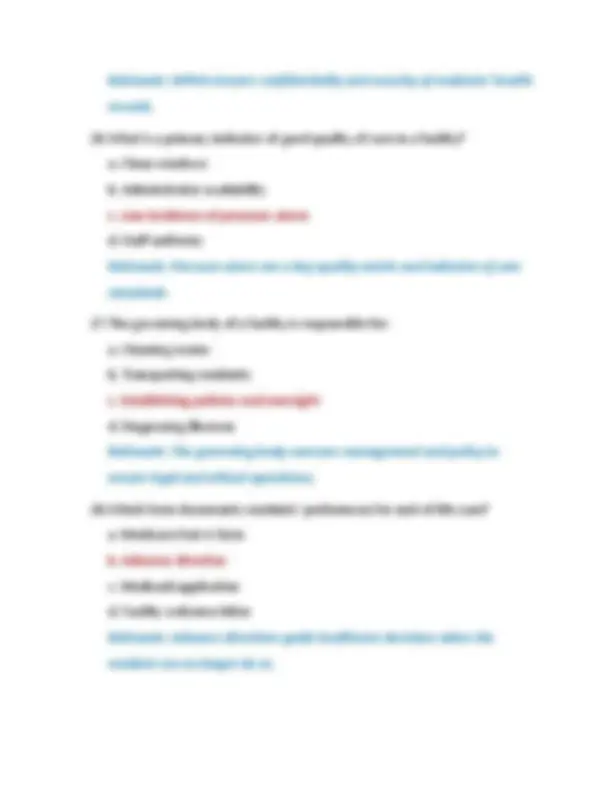
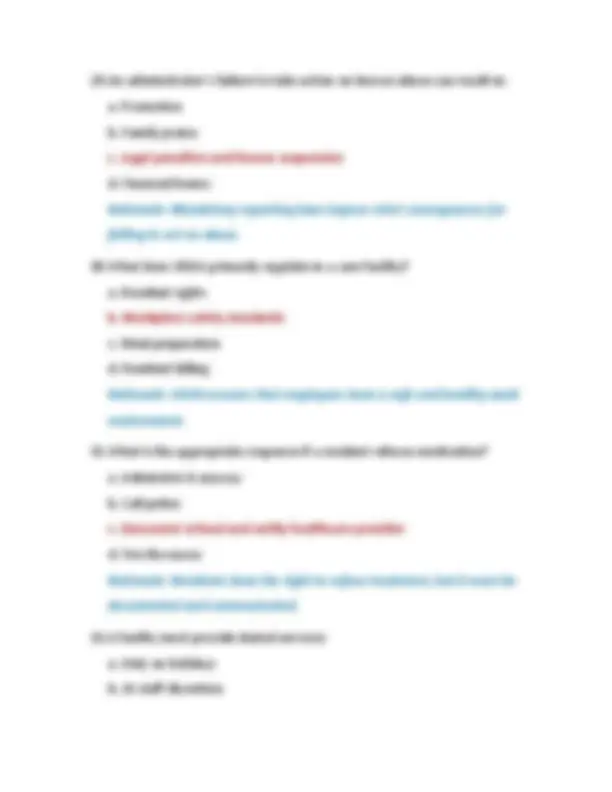
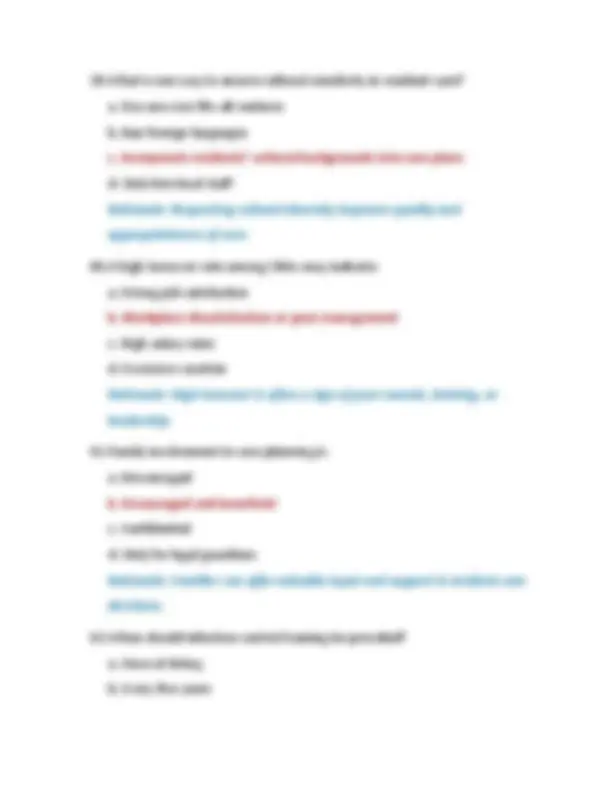
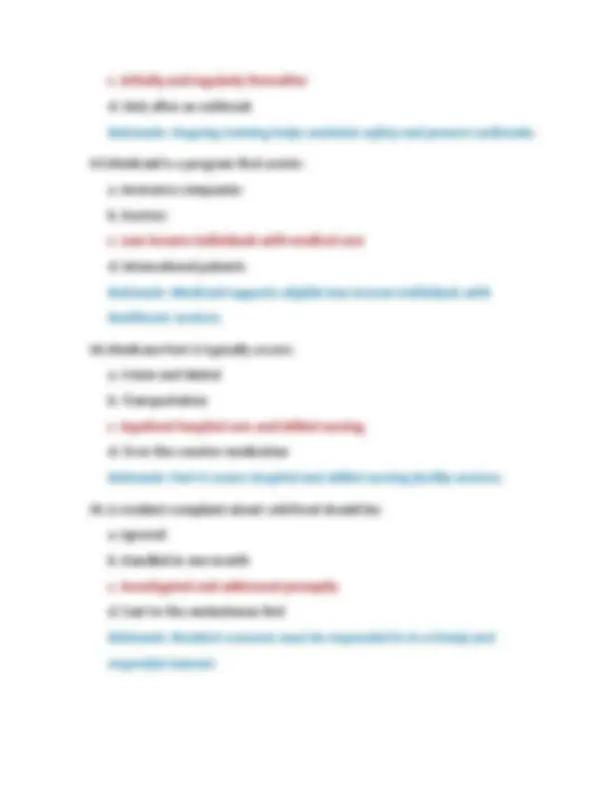
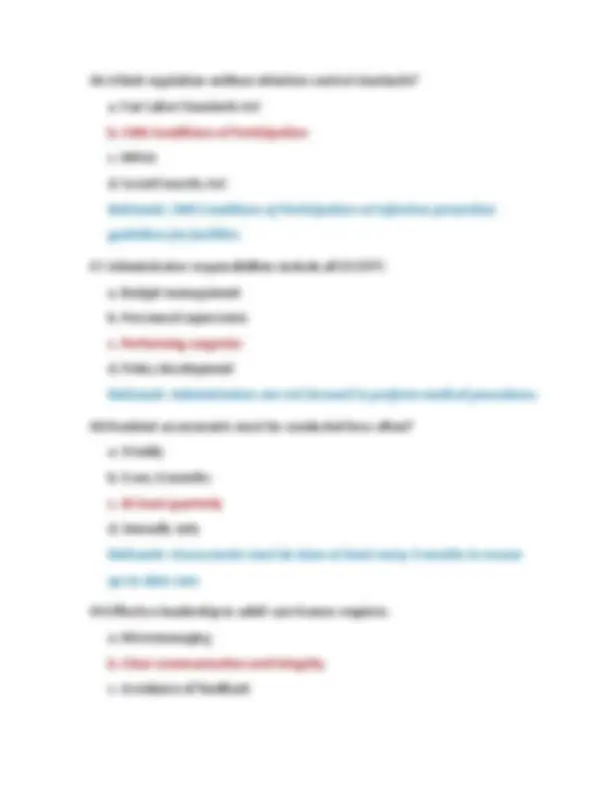
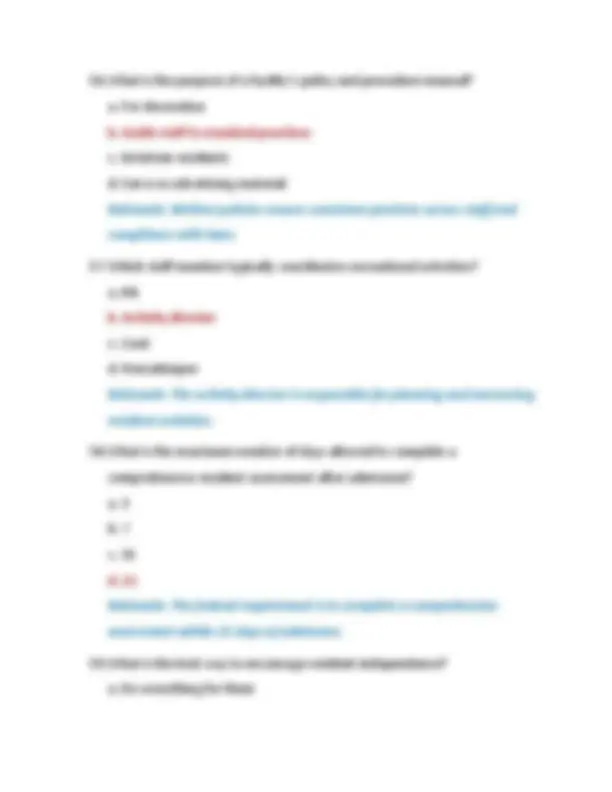
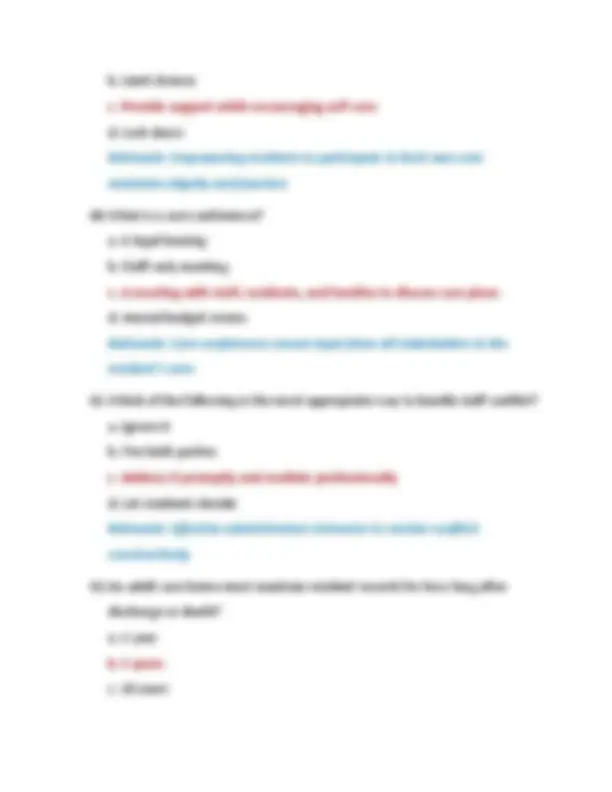
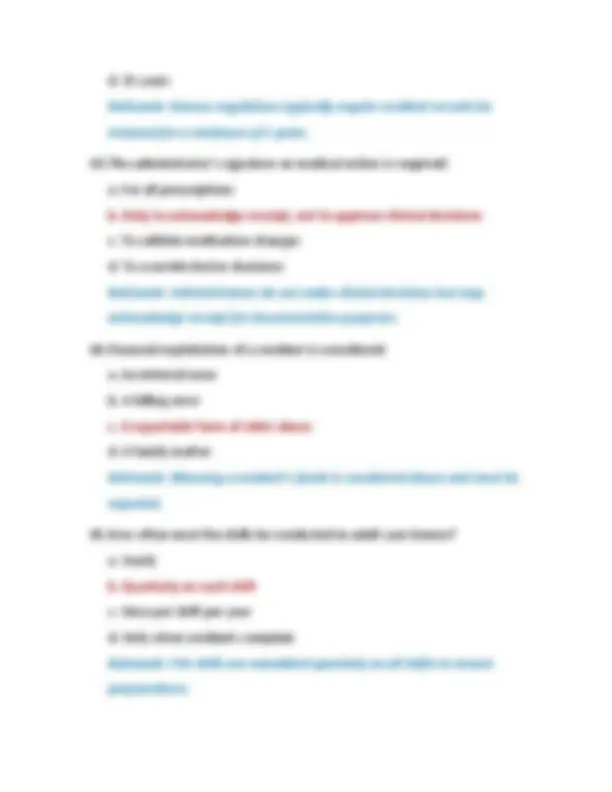
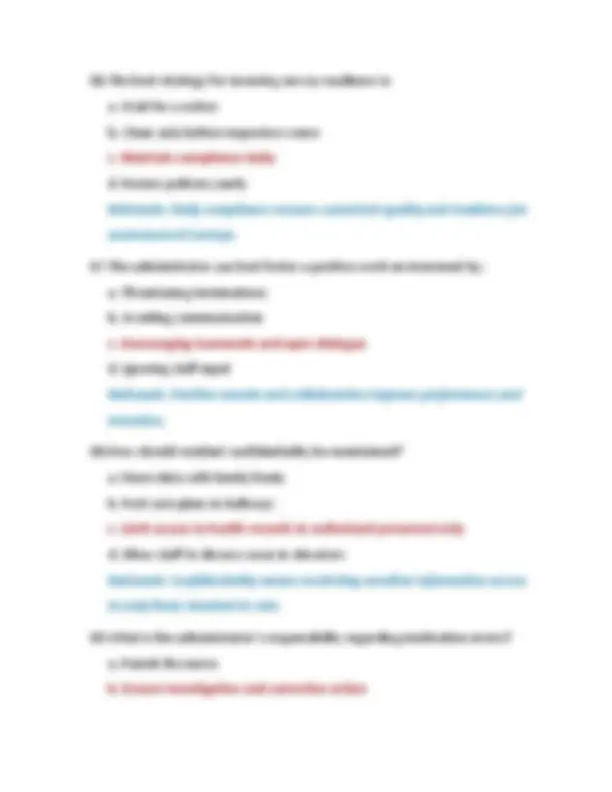
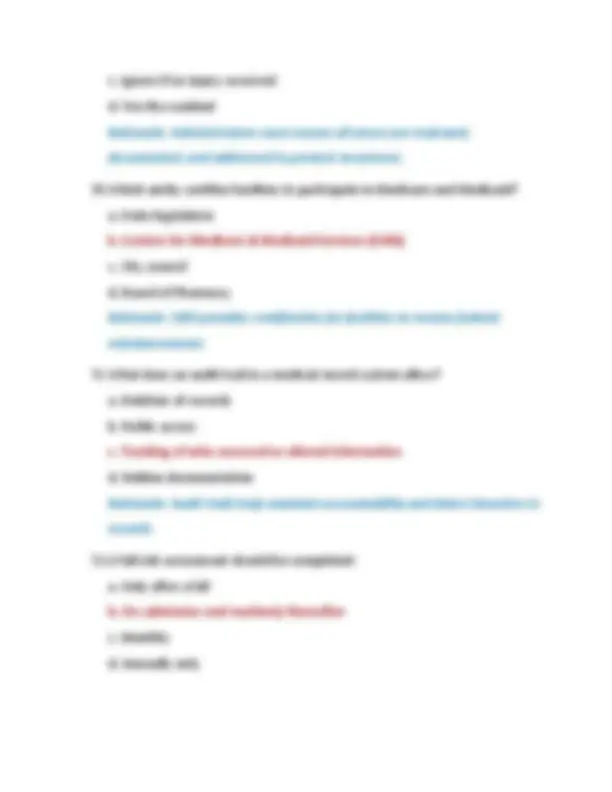
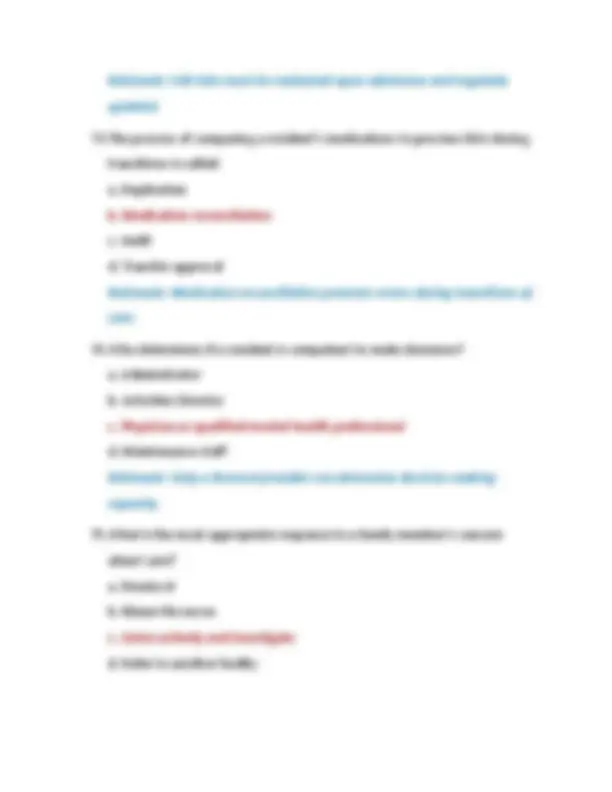
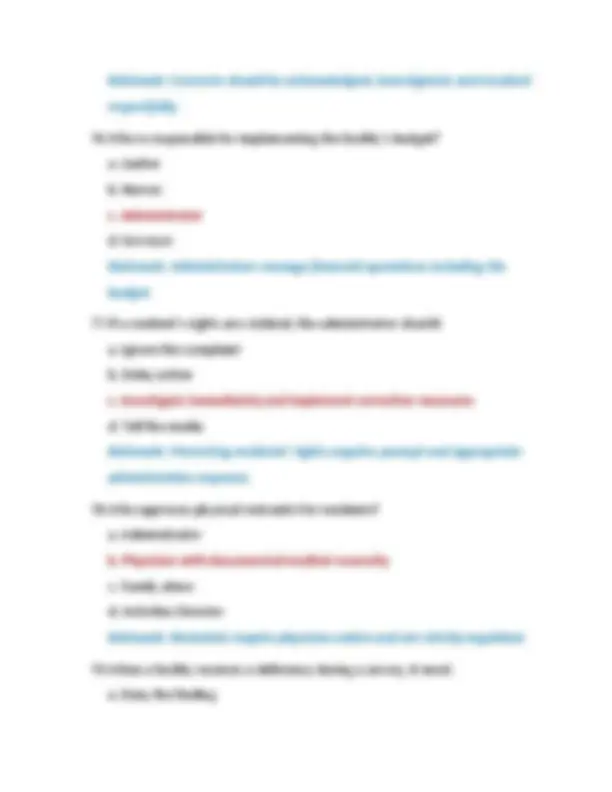
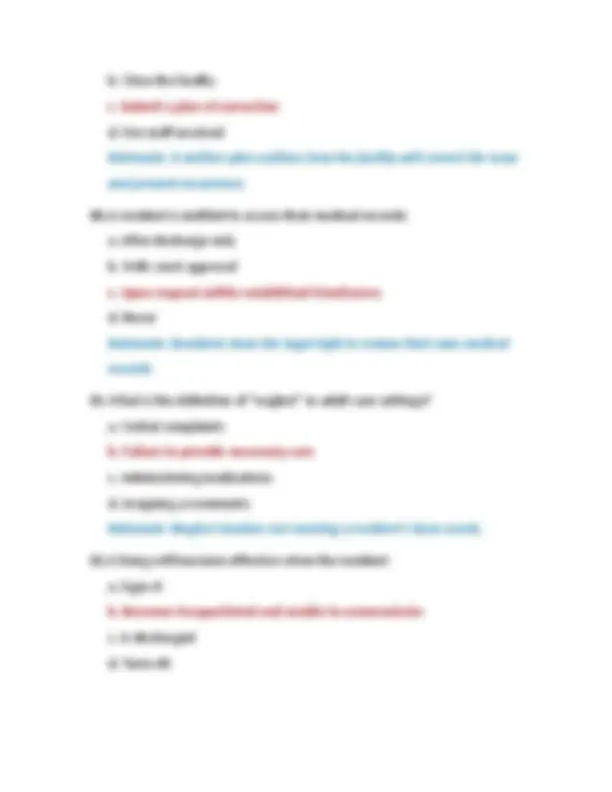
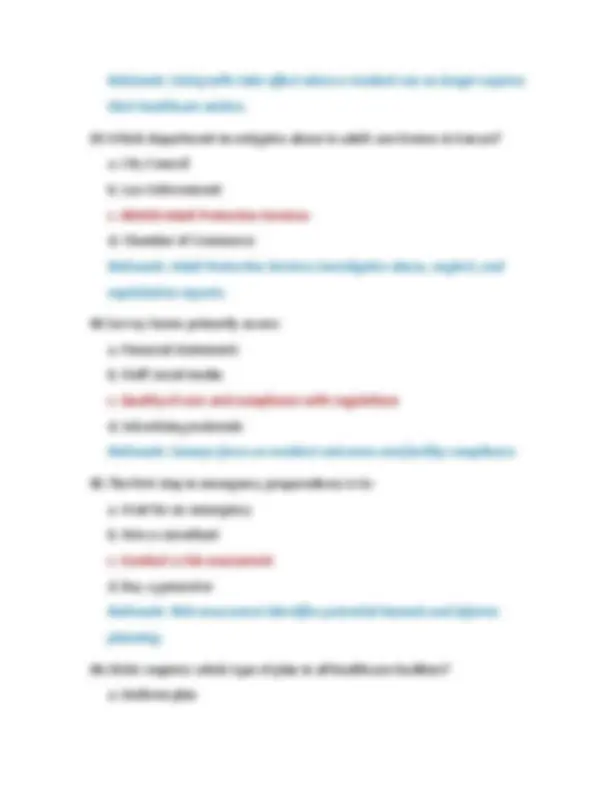
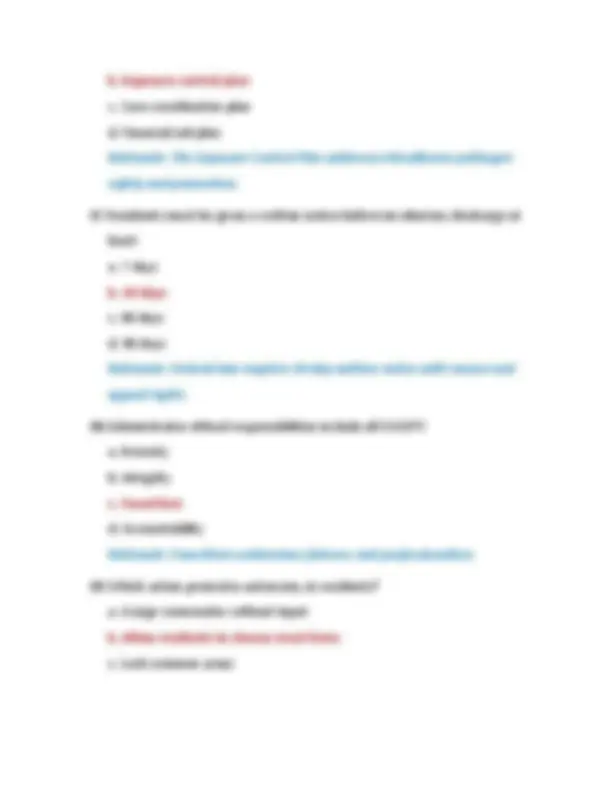
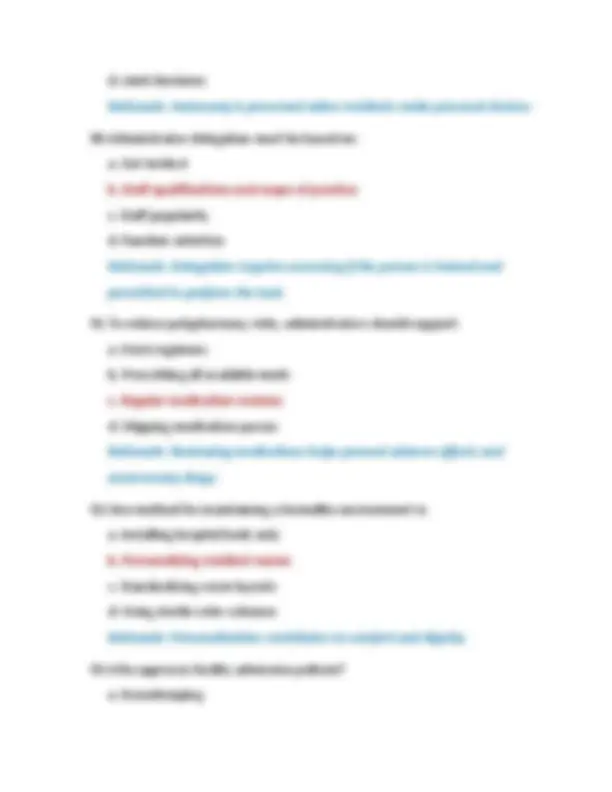
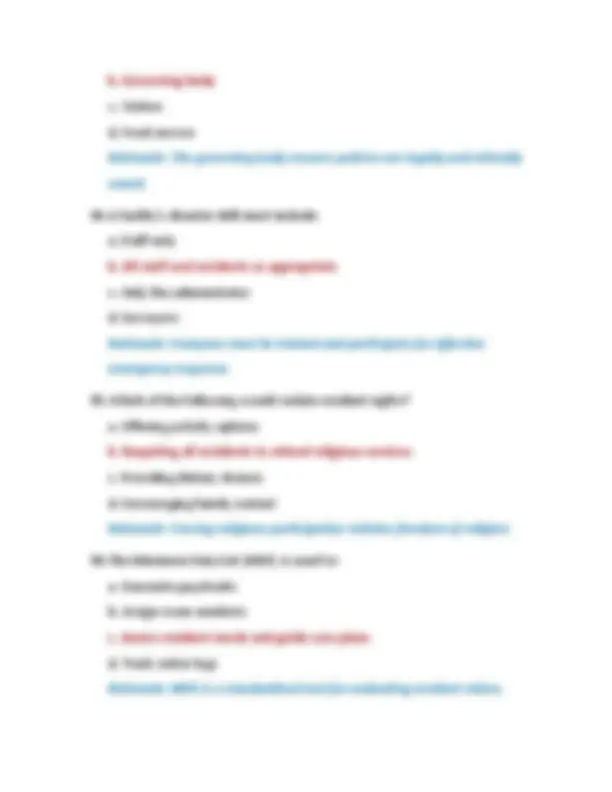
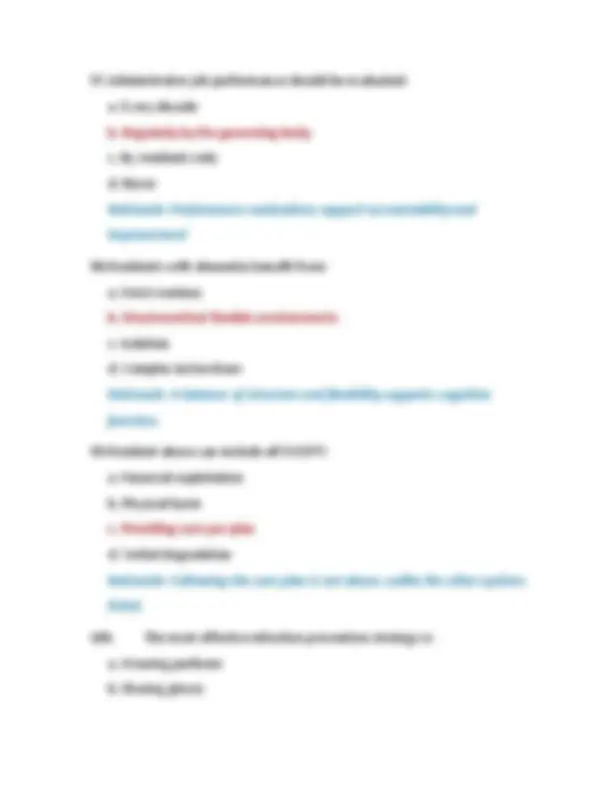



Study with the several resources on Docsity

Earn points by helping other students or get them with a premium plan


Prepare for your exams
Study with the several resources on Docsity

Earn points to download
Earn points by helping other students or get them with a premium plan
Community
Ask the community for help and clear up your study doubts
Discover the best universities in your country according to Docsity users
Free resources
Download our free guides on studying techniques, anxiety management strategies, and thesis advice from Docsity tutors
Kansas Behavioral Science Regulatory Board (Adult Care Home Administrator) Questions And Correct Answers (Verified Answers) Plus Rationales 2025 Q&A | Instant Download
Typology: Exams
1 / 31

This page cannot be seen from the preview
Don't miss anything!
























c. 21 d. 25 Rationale: Kansas requires administrators to be at least 21 years of age to ensure maturity and responsibility.
Rationale: Falsifying records is considered unethical and illegal in any healthcare setting. 10.What is the most appropriate response to a suspected case of elder abuse? a. Ignore and monitor b. Ask another staff member to handle it c. Immediately report it to the proper authorities d. Inform the family without documentation Rationale: Kansas law requires mandatory reporting of suspected abuse by administrators. 11.What is the primary purpose of a Quality Assurance and Performance Improvement (QAPI) program? a. Reduce staff wages b. Increase occupancy c. Satisfy investor requirements d. Improve care and services through continuous evaluation Rationale: QAPI programs focus on improving resident care and facility services through ongoing quality assessment. 12.In the event of a fire, the administrator should first: a. Call the media b. Evacuate all residents personally c. Activate the facility’s emergency response plan d. Wait for fire marshal instructions
Rationale: The emergency response plan should be implemented immediately during a fire. 13.Which federal law established residents’ rights in nursing homes? a. HIPAA b. Nursing Home Reform Act (OBRA 1987) c. Medicare Act d. Safe Care Act Rationale: OBRA 1987 established a resident bill of rights and quality standards in long-term care facilities. 14.Which professional is responsible for ensuring a resident’s care plan is implemented properly? a. Kitchen staff b. Activity director c. Interdisciplinary care team d. Volunteers Rationale: The care team, including nurses, therapists, and physicians, ensures care plans are followed. 15.What is the role of the ombudsman in adult care homes? a. Enforces facility policy b. Manages payroll c. Advocates for residents and investigates complaints d. Conducts physical exams Rationale: Ombudsmen protect resident rights and address grievances.
c. Provides a system for resolving resident complaints d. Protects only the administrator Rationale: Grievance policies protect residents and ensure complaints are addressed. 20.Resident rights must be explained to the individual: a. Once per year b. Upon admission and as needed c. Only if requested d. When a complaint is made Rationale: Residents must be informed of their rights upon admission and whenever changes occur. 21.The care plan must be developed within how many days of a resident’s admission? a. 3 b. 5 c. 7 d. 14 Rationale: Federal regulations require an initial care plan within 7 days after the initial assessment. 22.The dietary manager must meet standards set by: a. The American Red Cross b. The Federal Emergency Agency c. The Kansas Department of Aging and Disability Services d. OSHA
Rationale: State agencies regulate food service standards and staff qualifications in care homes. 23.Who has the legal authority to make healthcare decisions for a resident who is incapacitated? a. Any staff member b. A roommate c. The designated healthcare power of attorney d. Dietary manager Rationale: Legal medical decisions must be made by the individual holding power of attorney. 24.If a resident elopes from the facility, what should be the administrator’s immediate action? a. Notify family in the next week b. Document and ignore c. Activate the missing resident policy and notify law enforcement d. Wait to see if they return Rationale: Resident elopement is a critical incident requiring emergency response and reporting. 25.HIPAA regulations are designed to protect: a. Facility income b. Staff disciplinary records c. Resident health information d. Visitor data
29.An administrator’s failure to take action on known abuse can result in: a. Promotion b. Family praise c. Legal penalties and license suspension d. Financial bonus Rationale: Mandatory reporting laws impose strict consequences for failing to act on abuse. 30.What does OSHA primarily regulate in a care facility? a. Resident rights b. Workplace safety standards c. Meal preparation d. Resident billing Rationale: OSHA ensures that employees have a safe and healthy work environment. 31.What is the appropriate response if a resident refuses medication? a. Administer it anyway b. Call police c. Document refusal and notify healthcare provider d. Fire the nurse Rationale: Residents have the right to refuse treatment, but it must be documented and communicated. 32.A facility must provide dental services: a. Only on holidays b. At staff discretion
c. As part of required routine and emergency care d. Only to Medicaid recipients Rationale: Dental services are part of comprehensive care and must be accessible. 33.Incident reports should be: a. Shared on social media b. Placed in the resident’s chart c. Filed separately from medical records d. Given to visitors Rationale: Incident reports are administrative tools and should not be placed in medical records. 34.Which of the following is NOT a core value of person-centered care? a. Dignity b. Uniformity c. Respect d. Choice Rationale: Person-centered care prioritizes individuality, not rigid uniform practices. 35.If a resident's behavior becomes aggressive, the administrator should first ensure: a. Eviction b. Resident and staff safety c. Isolation
39.What is one way to ensure cultural sensitivity in resident care? a. Use one-size-fits-all routines b. Ban foreign languages c. Incorporate residents’ cultural backgrounds into care plans d. Only hire local staff Rationale: Respecting cultural diversity improves quality and appropriateness of care. 40.A high turnover rate among CNAs may indicate: a. Strong job satisfaction b. Workplace dissatisfaction or poor management c. High salary rates d. Excessive vacation Rationale: High turnover is often a sign of poor morale, training, or leadership. 41.Family involvement in care planning is: a. Discouraged b. Encouraged and beneficial c. Confidential d. Only for legal guardians Rationale: Families can offer valuable input and support in resident care decisions. 42.When should infection control training be provided? a. Once at hiring b. Every five years
c. Initially and regularly thereafter d. Only after an outbreak Rationale: Ongoing training helps maintain safety and prevent outbreaks. 43.Medicaid is a program that assists: a. Insurance companies b. Doctors c. Low-income individuals with medical care d. International patients Rationale: Medicaid supports eligible low-income individuals with healthcare services. 44.Medicare Part A typically covers: a. Vision and dental b. Transportation c. Inpatient hospital care and skilled nursing d. Over-the-counter medication Rationale: Part A covers hospital and skilled nursing facility services. 45.A resident complaint about cold food should be: a. Ignored b. Handled in one month c. Investigated and addressed promptly d. Sent to the ombudsman first Rationale: Resident concerns must be responded to in a timely and respectful manner.
d. Frequent absences Rationale: Good leaders communicate well and act ethically to maintain team trust. 50.Which is a key indicator of effective facility management? a. High complaint volume b. Multiple lawsuits c. Low deficiency citations during inspections d. Staff dissatisfaction Rationale: Few citations show regulatory compliance and quality operations. 51.The administrator is responsible for ensuring staff receive orientation within how many days of hire? a. 60 b. 45 c. 30 d. 90 Rationale: Orientation must be completed within 30 days to ensure staff are competent and compliant with facility policies. 52.What is the primary focus of restorative nursing programs? a. Provide entertainment b. Reduce nursing workload c. Maintain or improve resident functioning d. Replace physical therapy
Rationale: Restorative care helps residents retain or regain abilities to function independently. 53.A facility’s infection control program must be: a. Developed by kitchen staff b. Informal and unwritten c. Documented and reviewed regularly d. Optional for small facilities Rationale: Infection control must be a structured and regularly reviewed component of facility policy. 54.If a resident is experiencing significant weight loss, the administrator should: a. Do nothing b. Ensure assessment and interdisciplinary team review c. Ignore until next quarter d. Notify visitors Rationale: Unplanned weight loss is a clinical issue that needs prompt evaluation. 55.The Kansas Department for Aging and Disability Services (KDADS) oversees: a. Fire code enforcement b. School curriculum c. Licensing and regulation of adult care homes d. Highway safety Rationale: KDADS is the state agency responsible for regulation of long- term care services.
b. Limit choices c. Provide support while encouraging self-care d. Lock doors Rationale: Empowering residents to participate in their own care maintains dignity and function. 60.What is a care conference? a. A legal hearing b. Staff-only meeting c. A meeting with staff, residents, and families to discuss care plans d. Annual budget review Rationale: Care conferences ensure input from all stakeholders in the resident’s care. 61.Which of the following is the most appropriate way to handle staff conflict? a. Ignore it b. Fire both parties c. Address it promptly and mediate professionally d. Let residents decide Rationale: Effective administrators intervene to resolve conflicts constructively. 62.An adult care home must maintain resident records for how long after discharge or death? a. 1 year b. 5 years c. 10 years
d. 15 years Rationale: Kansas regulations typically require resident records be retained for a minimum of 5 years. 63.The administrator’s signature on medical orders is required: a. For all prescriptions b. Only to acknowledge receipt, not to approve clinical decisions c. To validate medication changes d. To override doctor decisions Rationale: Administrators do not make clinical decisions but may acknowledge receipt for documentation purposes. 64.Financial exploitation of a resident is considered: a. An internal issue b. A billing error c. A reportable form of elder abuse d. A family matter Rationale: Misusing a resident’s funds is considered abuse and must be reported. 65.How often must fire drills be conducted in adult care homes? a. Yearly b. Quarterly on each shift c. Once per shift per year d. Only when residents complain Rationale: Fire drills are mandated quarterly on all shifts to ensure preparedness.